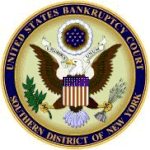
The United States courts of appeals are the intermediate appellate courts of the United States federal judiciary. They hear appeals of cases from the United States district courts and some U.S. administrative agencies, and their decisions can be appealed to the Supreme Court of the United States. The courts of appeals are divided into 13 "Circuits". Eleven of the circuits are numbered "First" through "Eleventh" and cover geographic areas of the United States and hear appeals from the U.S. district courts within their borders. The District of Columbia Circuit covers only Washington, DC. The Federal Circuit hears appeals from federal courts across the entire United States in cases involving certain specialized areas of law.

The United States district courts are the trial courts of the U.S. federal judiciary. There is one district court for each federal judicial district. Each district covers one U.S. state or a portion of a state. There is at least one federal courthouse in each district, and many districts have more than one. District court decisions are appealed to the U.S. court of appeals for the circuit in which they reside, except for certain specialized cases that are appealed to the U.S. Court of Appeals for the Federal Circuit or directly to the U.S. Supreme Court.
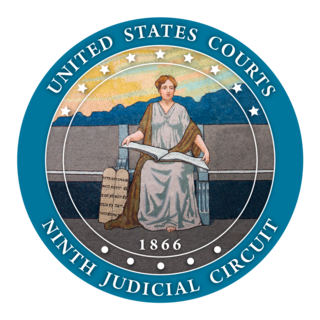
The United States Court of Appeals for the Ninth Circuit is the U.S. federal court of appeals that has appellate jurisdiction over the U.S. district courts for the following federal judicial districts:

The United States District Court for the Southern District of New York is a federal trial court whose geographic jurisdiction encompasses eight counties of the State of New York. Two of these are in New York City: New York (Manhattan) and Bronx; six are in the Hudson Valley: Westchester, Putnam, Rockland, Orange, Dutchess, and Sullivan. Appeals from the Southern District of New York are taken to the United States Court of Appeals for the Second Circuit.
The federal judiciary of the United States is one of the three branches of the federal government of the United States organized under the United States Constitution and laws of the federal government. The U.S. federal judiciary consists primarily of the U.S. Supreme Court, the U.S. Courts of Appeals, and the U.S. District Courts. It also includes a variety of other lesser federal tribunals.

Masses Publishing Co. v. Patten, 244 F. 535, was a decision by the United States District Court for the Southern District of New York, that addressed advocacy of illegal activity under the First Amendment. The Second Circuit Court of Appeals overturned Hand’s ruling in Masses Publishing Co. v. Patten (1917).
Jed Saul Rakoff is a senior United States district judge of the United States District Court for the Southern District of New York.

Richard Miles Berman is a senior United States district judge of the United States District Court for the Southern District of New York.

Charles Merrill Hough was a United States circuit judge of the United States Court of Appeals for the Second Circuit and previously was a United States District Judge of the United States District Court for the Southern District of New York.
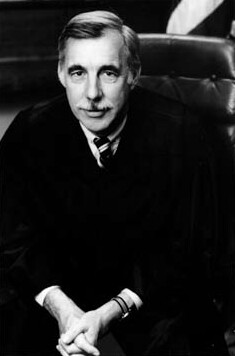
Robert Workman Sweet was an American jurist and United States district judge of the United States District Court for the Southern District of New York.
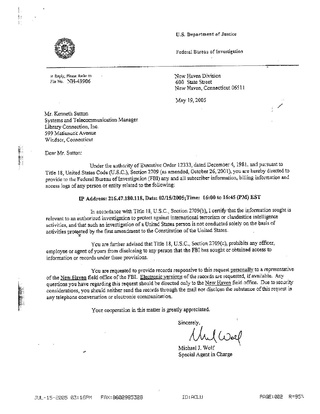
John Doe v. Alberto R. Gonzales was a case in which the American Civil Liberties Union (ACLU), Library Connection, and several then-pseudonymous librarians, challenged Section 2709 of the Patriot Act; it was consolidated on appeal with a separate case, Doe v. Ashcroft.
The Judicial Conference of the United States, formerly known as the Conference of Senior Circuit Judges, was created by the United States Congress in 1922 with the principal objective of framing policy guidelines for administration of judicial courts in the United States. The Conference derives its authority from 28 U.S.C. § 331, which states that it is headed by the chief justice of the United States and consists of the chief justice, the chief judge of each court of appeals federal regional circuit, a district court judge from various federal judicial districts, and the chief judge of the United States Court of International Trade.
Naomi Lynn Reice Buchwald is a senior United States district judge of the United States District Court for the Southern District of New York.
Denise Louise Cote is a senior United States district judge of the United States District Court for the Southern District of New York.

Kevin Thomas Duffy was an American lawyer and United States district judge of the United States District Court for the Southern District of New York.
Barbara Sue Jones is a former United States district judge of the United States District Court for the Southern District of New York. She has been the monitor of the Trump Organization for the New York state courts since 2022, and since the February 16, 2024 decision barring Donald Trump and his sons from running the company, she has "total oversight of the real-estate conglomerate".

Gerard Edmund Lynch is an American lawyer who serves as a senior United States circuit judge of the United States Court of Appeals for the Second Circuit. He was confirmed to that seat on September 17, 2009, after previously having been appointed in 2000 by President Bill Clinton to serve on the United States District Court for the Southern District of New York. Judge Lynch was the first appeals-court judge nominated by President Barack Obama to win confirmation from the United States Senate.

Paul Adam Engelmayer is a United States district judge of the United States District Court for the Southern District of New York.

Alison Julie Nathan is an American lawyer who has served as a United States circuit judge of the United States Court of Appeals for the Second Circuit since 2022. She served as a United States district judge of the United States District Court for the Southern District of New York from 2011 to 2022. She previously served as associate White House counsel for President Barack Obama.
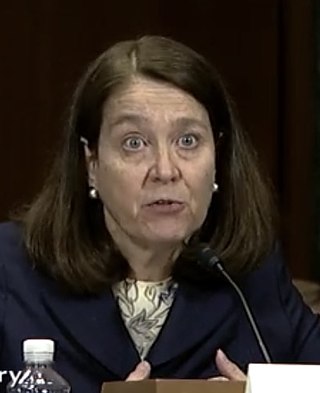
Mary Kay Vyskocil is a United States district judge of the United States District Court for the Southern District of New York and a former United States bankruptcy judge for the same court. President Donald Trump nominated her to the district bench in 2018 and again in 2019, and she was confirmed in 2019.
